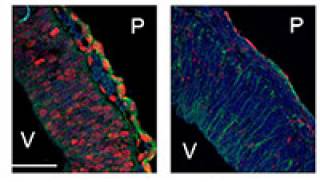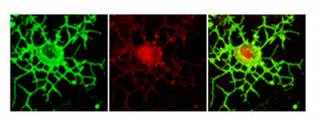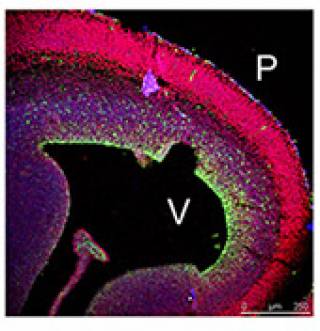Epigenetic Regulation of Neural Development

Tel: 0207 679 6272
Email: a.chittka@ucl.ac.uk
All the neurons and glia of the mature central nervous system (CNS) are generated from the neuroepithelial stem cells (NSCs) of the embryonic neural tube. How do the NSCs decide to preserve their "stemness" or to embark on differentiation is my major research question.
Cross-talk between extracellular signals (e.g. polypeptide growth factors) and cell-intrinsic programmes plays a central role in determining cell fate. Ultimately, extrinsic signals converge on chromatin (DNA wrapped around histones) to remodel its structure and accessibility to the transcriptional machinery - either activating or silencing genes that influence cell lineage decisions. Chromatin remodeling in a broad sense includes DNA methylation, post-translational histone modifications and non-coding RNAs. Intriguingly, mutations in several of the known chromatin modifying enzymes lead to mental retardation syndromes in humans, highlighting their importance in both guiding normal neural development and maintaining neural function.
My special interest is to understand how post-translational histone modifications control cortical development. Histones can be phosphorylated, acetylated and methylated, to name but a few modifications. The precise combination of histone modifications constitutes the "histone code" that defines the transcriptional profile of the cell and hence its identity. I am focusing on the role of histone arginine methylation in the control of NSC "stemness", proliferation and differentiation. Histone/protein arginine methylation is catalyzed by dedicated enzymes, protein arginine methyltransferases (PRMTs), which can mediate subtly different modifications of arginine residues. The biological outcomes of these post-translational modifications are still poorly understood, despite the implicated roles of PRMTs in various pathological conditions, e.g., cancer, cardiovascular diseases and others.
I recently found that a member of the PRDM family of transcriptional regulators - PRDM4 - recruits the protein arginine methyltransferase, PRMT5, to mediate histone arginine methylation and that the PRDM4/PRMT5 complex maintains the "stem-like" cellular state of NSCs. I am now combining molecular, cell biological and biochemical methods with tissue-specific gene knockouts in mice to understand PRDM4 and PRMT5 function and the regulation of their activity. In the longer term, understanding the mechanisms that re-program NSCs to fully differentiated neurons or glial cells during development will pave the way for stem cell-based therapies for neurological disease.
I am also involved in a public outreach programme at UCL - "in2sciene" which provides placements for gifted A-level students from low income backgrounds (www.in2scienceuk.org). Please get in touch if you are interested!
 Close
Close




